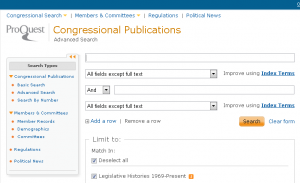 It’s a beta site, with a simplified search screen and sleek new search results, available at: http://beta.congress.gov/
It’s a beta site, with a simplified search screen and sleek new search results, available at: http://beta.congress.gov/
Searching’s easier – there’s a big search box that doesn’t default to the most current session. And once you see your results, you can narrow on the left by date, chamber, subject, and other categories (just like in some expensive legal research systems.)
Once you’re in a search result, it’s now much easier it is to tell how far along a bill is, what its text is, and what kind of related information exists — e.g. the Leahy-Smith America Invents Act of 2011:
For those of you who aren’t government information fanatics: this is a Big Deal. The THOMAS website was groundbreaking at its launch in the 1990s. It’s been gradually updated to its current state, where it still does an admirable job providing information about legislation and the legislative process. However, this update looks like an attempt to make some big changes — to make the site much more modern and intuitive in the way it looks and acts. It’s even responsive, so it’s still legible on my phone’s tiny screen.
There are some significant chunks of information still missing. For example, the beta site doesn’t yet seem to have an option to view all the actions on a bill (vs. just the “Major Actions), and there are no click-through links to everybody’s favorite legislative history resource – Congressional Reports. But it’s a great start on making free government information easier to use, and I look forward to seeing how it develops.
Update: “Other data, such as the Congressional Record, committee reports, nominations, treaties and communications, will be incorporated over time in a planned, prioritized order. The Library anticipates Congress.gov will operate as a beta site for approximately one year as this work is completed.” – http://www.loc.gov/today/pr/2012/12-171.html
H/T: Sunlight Foundation, “Congress launches THOMAS successor Congress.gov,” 9/19/2012.
 We’ve got ’em—just ask at the Service Counter if you’d like a pair! In related news:
We’ve got ’em—just ask at the Service Counter if you’d like a pair! In related news:


 The Law Library is beginning an expansion project! Some key dates from the current plan:
The Law Library is beginning an expansion project! Some key dates from the current plan:
